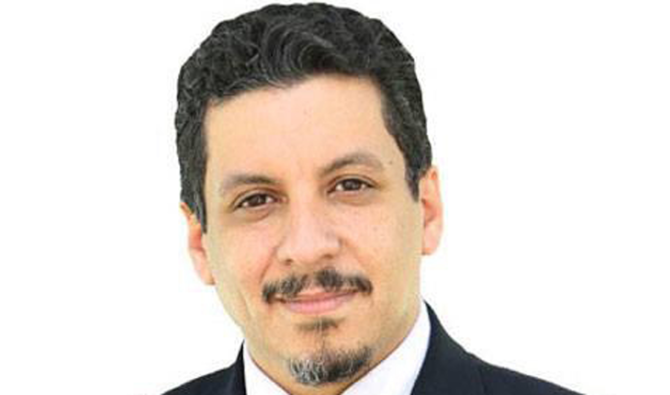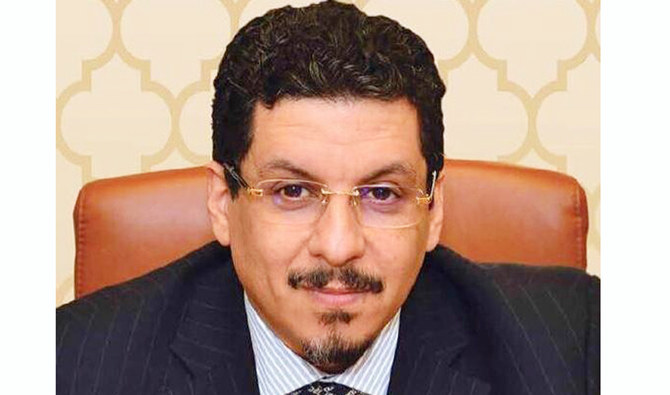AL-MUKALLA: Yemen was forced to use the military option to pressure the Iranian-backed Houthis to come to the negotiating table since they never complied with peace deals, the country’s ambassador to the US has told Arab News.
“The military option has never been our choice or something that we initiated,” Ahmed bin Mubarak said.
“The government has always sought peace since the beginning of the war by signing the Peace and National Partnership Agreement,” he said, referring to the first peace deal that the internationally recognized government signed with the Houthis, which was designed to defuse the tension caused by the rebels’ takeover of Sana’a.
Fighting in Yemen has escalated over the past couple of months following Houthi drone and missile attacks that killed more than 110 soldiers and civilians at a military base in the city of Marib.
The Houthis intensified attacks on government forces in Nehim, outside Sana’a, Marib’s Serwah and the northern province of Jawf.
Hundreds of soldiers and civilians have been killed since early last month.
The Yemeni ambassador said that the latest Houthi escalation in shelling and fighting coincided with intensive diplomatic efforts by the UN envoy to Yemen and European diplomats who sought to break the impasse in peace talks.
The escalation during peace efforts, Bin Mubarak said, is a sign that the Houthis are not serious about peace.
“Any concrete advance in peace efforts and addressing important issues are always matched with an escalation by the Houthis. We have no other choice but to defend ourselves against the escalation,” he said, adding that the Houthis read concessions by the government as signs of weakness. Instead of reciprocating the concessions by making similar concessions, they launched attacks on government forces.
“The intensity of Houthi attacks on Jawf shows that they have been preparing for the escalation for a long time,” Bin Mubarak said.
Bin Mubarak, who holds a Ph.D. in business administration from Baghdad University, was President Abed Rabbo Mansour Hadi’s chief of staff when Houthis seized the capital and placed Hadi under house arrest in early 2015.
He was detained by the Houthis for two weeks. In July 2015, he was appointed as ambassador of the Republic of Yemen to the US. He has served as a senior adviser in Yemeni government delegations during the several rounds of UN-brokered peace talks in Geneva, Biel and Kuwait.
He is also nonresident ambassador of Yemen to Brazil.
Last year, fighting on major battlefields largely subsided as UN Yemen Envoy Martin Griffiths announced that the number of air strikes by the Saudi-led coalition dropped by nearly 80 percent.
FASTFACTS
• Ahmed bin Mubarak, who holds a Ph.D. in business administration from Baghdad University, was appointed as ambassador of the Republic of Yemen to the US in July 2015.
• He has served as a senior adviser in Yemeni government delegations during the several rounds of UN-brokered peace talks in Geneva, Biel and Kuwait.
• He is also non-resident ambassador of Yemen to Brazil.
Those signs were seen as goodwill indicators by the Saudi-led coalition and the Yemeni government. In 2019, many Yemen watchers predicted that the country was inching closer to a peace deal.
The mood changed when Houthis bombed a mosque and killed 100 soldiers.
“We are now far from peace as a result of the escalatory steps taken by Houthis on more than one front,” he said. The military pressure in the western province of Hodeida convinced the Houthis to go to Stockholm to sign a peace deal with the government in 2018, he said.
“Without the Hodeida (military) operation and reaching 3 km
from Hodeida seaport, the Houthis would not have come to Stockholm.”
The Yemeni diplomat links the government’s participation in future talks with the Houthis to making progress in the implementation of Stockholm Agreement terms.
“We have reiterated that there should be confidence-building measures to show that this group (the Houthis) are serious. We cannot accept that the international community asks for pushing forward and forgetting what happened,” he said, adding that there had been no big change on the ground since the Stockholm Agreement. The Houthis have not pulled out of Hodeida seaport or agreed to stop hostilities in the city.
In March, Yemenis will mark the fifth anniversary of the Saudi-led military operation that titled the balance of the war in favor of government forces. Bin Mubarak said that the Saudi-led coalition disrupted Iranian designs in Yemen and salvaged Yemeni and Arab national security.
“Without this intervention, Iran would have expanded its influence in the region and fulfilled its dream of seizing control of four Arab capitals,” he said.
Regarding the power-sharing agreement that the government signed with the separatist Southern Transitional Council in Riyadh last year, Bin Mubarak said that the agreement has unified the Yemeni forces that oppose Iran’s scheme in Yemen. His government is still committed to the deal despite failing to meet some deadlines.
“We fully trust the brothers in the Kingdom of Saudi Arabia and are convinced that they will make every effort to pressure the parties to implement the terms of the agreement,” he said. The implementation of the agreement would pave the way for long-sought reform in the government’s security and military bodies, he said.






























